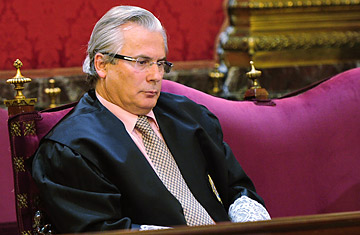
Spanish judge Baltasar Garzón attends the first day of his trial in Madrid on Jan. 17, 2012
Baltasar Garzón is one of the most renowned magistrates in the world, so tireless in his quest for justice that national boundaries and foreign jurisdictions failed to stop him. On Thursday, however, Garzón himself was found guilty of criminal behavior. Best known for arresting Chilean dictator Augusto Pinochet for crimes against humanity, the Spanish judge was convicted by a Madrid court for ordering illegal eavesdropping; he was barred from practicing law for 11 years. Although many observers in and out of Spain understand why these particular charges were brought against the judge, both the extraordinary treatment he has received, and the fact that this case is one of three pending against him, have convinced many that Garzón is the victim of a witch hunt. For them, Thursday's verdict only confirms that sense.
Garzón has long been a divisive figure in Spain. From his seat on the National Court, he has gone after crime mobs, terrorists and, in the 1980s, his own government's dirty war against militant Basque separatists. As the world's foremost practitioner of universal jurisdiction, he has also investigated human-rights abuses in Guatemala and Guantánamo. In addition to famously ordering Pinochet's extradition, he also convicted Argentine naval officer Adolfo Scilingo for crimes against humanity in that country's dirty war.
But his reputation as an unyielding defender of justice did not protect him from — and indeed may have contributed to — being prosecuted himself. Since 2010, he has been indicted for criminal abuse of power in three separate cases. One, which concluded hearings yesterday and is currently awaiting sentencing, questions the legality of his investigation into the disappearance of an estimated 114,000 people during Spain's 1936-39 civil war and the early years of the dictatorship that followed. Another centers on his alleged dismissal of charges against Emilio Botín, director of Banco Santander, after the bank sponsored a course at New York University for which the judge purportedly received an honorarium.
In the case decided Thursday, Garzón ordered police to record conversations between suspects held in prison and their attorneys. Because the suspects were indicted for high-level corruption, and because he suspected the lawyers of laundering their clients' money, Garzón argued, the eavesdropping was warranted. The prosecuting attorney didn't see it that way, characterizing the judge's actions as "monstrous" and accusing him of being "some kind of Big Brother who thinks he can listen to everything." Ever combative, Garzón declared after the verdict: "This sentence, lacking in juridical basis or supporting evidence, eliminates any possibility of investigating corruption and its associated crimes. Instead, it makes room for impunity and, in its fervor to impugn one particular judge, crushes the independence of the entire Spanish judiciary."
The Spanish constitution allows for breach of attorney-client privilege only in extremely grave cases, and only under judicial order. In the past, that exception has been applied to things like terrorism or international drug cartels, but even Garzón's supporters find corruption to be of a different order. "The law is very vague, and the line is very thin," says Spanish-born attorney Almudena Bernabéu, who, in her capacity as prosecutor at the San Francisco–based Center for Justice and Accountability, has twice presented cases in Garzón's courtroom. "It's hard to say that what he did was illegal per se, but it was certainly very questionable."
Still, Bernabéu, like other legal experts, isn't sure that the punishment fits this particular crime. "It wan't right for Garzón to order the eavesdropping," says Joan Queralt, criminal-law professor at the University of Barcelona. "But when other judges have done the same thing, their cases have been thrown out, or they've been sanctioned for misconduct. But to turn around and prosecute the judge? That's like throwing a doctor in jail because one of his patients dies."
Some critics of the decision believe that this case — and the two others still pending — stem from Garzón's high profile (he is commonly referred to as a "superjudge") and apparent love of the spotlight (before being indicted he was a frequent presence on Spanish front pages and television screens). "There's a lot of reasons why the court would want to punish him," says Bernabéu. "But more than anything, it sounds and looks like revenge. Garzón is very famous, and envy and rivalry are endemic in Spain."
It may not have helped that the case just decided involved some very powerful people. Garzón was investigating officials within the ruling Popular Party — including Francisco Camps, who until mid-2011 was president of the regional government of Valencia — for charges of tax evasion, bribery and money laundering. "He uncovered the Popular Party's shameful acts," says law professor Queralt. "Once he got involved with the finances of the Popular Party, he opened Pandora's box."
That box still holds two pending verdicts. But unless Garzón wins on appeal, the 56-year-old's career is effectively at an end. It's an ironic finale for a man who dedicated his professional life to the pursuit of justice. But no more so than the fate of all those involved in this corruption case. A jury exonerated Camps and his accomplices in January. Which means that of all those involved in the massive corruption scandal, only the judge who pursued its investigation has been condemned.
